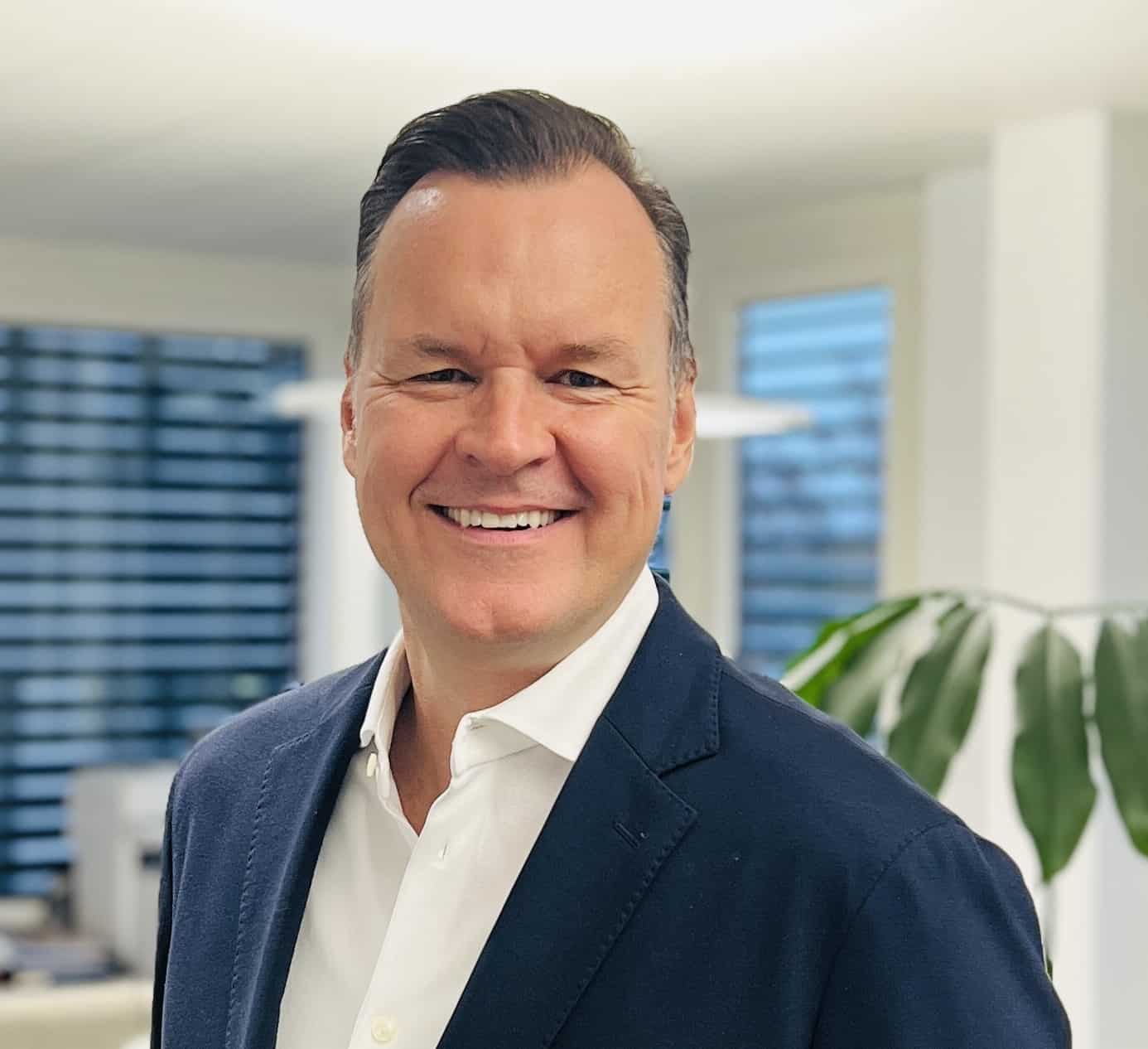More than two decades ago, Markus Schulte and his co-founder built a startup straight out of ETH Zurich, developed it into the market leader and successfully sold it. Today, in addition to his role as the CEO of Olmero he is an active investor in venture capital and private equity.

Co-Founder and CEO, Olmero
Markus Schulte founded the leading Swiss construction tender platform Olmero in 2000 with Oliver Behnen. The media company TX Group acquired Olmero in 2013 and sold it to the Swedish software company Byggfakta in 2020. Markus has a Ph.D. in Civil Engineering from ETH Zurich. He is part of Verve Ventures’ investor network.
Your first work experience during your high school years was on construction sites. Was this the reason you studied civil engineering?
Yes, but it was more than that. I just wanted to make money in the first place. I did not expect that working on construction sites would turn into an invaluable school-of-life experience for me. I learned to get up early and get things done even though they were hard. I had to gain respect from people of different ages and backgrounds and enjoyed the camaraderie you find in this environment. It was tough, but it turned me from a boy into a man.
You founded Olmero with Oliver Behnen while you two were still Ph.D. students. What gave you the impetus to try out entrepreneurship instead of presumably safer career options?
Back then, in 2000, the internet was still quite new and in a hype phase. Our idea came from leveraging new technology to address one of the big pain points of the construction industry. For every construction project, a multitude of different companies need to work together. Finding the right partners by tendering parts of a construction project was an inefficient and intransparent process. It created mountains of paperwork. Olmero was born with the ambition to digitize this process. Our approach was a cloud-based Software-as-a-Service model before these terms were even known. The market potential was big, obviously, but the defining moment was the McKinsey Venture 2000 competition when, out of 136 teams, Olmero won the second prize. This recognition fueled our enthusiasm. The visibility also allowed us to raise capital with the support from people from the construction industry.
What was the biggest challenge to building Olmero into a successful company?
We had the software and the funding sorted out, but the biggest challenge was to change people’s behavior. At that time, it was common in the construction industry to take pride in being traditional and doing things the old way. Additionally, we were in our early 30ies, trying to persuade 50-something year olds with an uncommon idea. There were countless occasions when we encountered substantial resistance to change. More than once we thought that we would never overcome it.
How did you do it?
We truly believed in the foundational idea of Olmero and had passion for it. The latter helped us encounter multiple business angels – people in management positions who supported us in driving adoption where they could. And after a while, the perception changed. It became obvious to almost everyone that digitalization was the future, and it was seen as a sign of lacking vision and perspective to be against it.
This paid off eventually, as Olmero became the market leader. You had a successful exit by selling your Olmero shares to TX Group. Yet, you remained CEO for over a decade and still are, instead of leaving after an earn-out period like many other founders. Why did you stay?
Because there have always been new and interesting challenges. Becoming part of a big group has downsides, such as additional reporting requirements, but they are manageable. The upside was that suddenly I had peers who built and ran successful marketplaces, which was quite interesting. Years later, it became apparent that Olmero wasn’t in TX’s strategic focus anymore. But this wasn’t a dead end either. The sale of Olmero to Byggfakta, which is mainly owned by the private equity firms Stirling Square Capital and TA Associates, added a new international dimension to my work, now we were the ones acquiring companies. On top of that, over the years Olmero’s team became like a family to me. These are people I enjoy working with. In the position of CEO, I can continue to do so and support them in advancing their careers.
The founder has his wealth concentrated in one firm and enjoys a large influence over the company. The investor takes a passive role and diversifies his holdings. The move from one mindset to the other is a tricky one. How did you go about it?
I have always been fascinated by capital markets and investment topics. I bought my first stocks when I was 14. Today, I spend only what I earn, which means that I can invest with a long-term investment horizon. In the beginning, after the exit, I started slowly, investing in stocks, managing part of my holdings myself, and employing an asset manager for the other part. Over the years, my fascination with private equity and venture capital has grown substantially. Compared to a traditional asset allocation, which would assign these two topics only a few percent, I’m heavily overexposed to these asset classes. They make up more than 50% of my portfolio and 100% of my passion as an investor.

Invest in Startups
As one of Europe’s most active venture capital investors, we grant qualified private investors access to top-tier European startups. With investments starting at EUR/CHF 10’000, you can build your own tailored portfolio over time and diversify across stages and sectors.
Why this concentration in illiquid asset classes?
Olmero’s success was possible only because people did the same, believed in and invested in us. Venture capital advances society. There needs to be an older generation of entrepreneurs that supports the next. Direct investments in startups give people with a vision the chance to develop them. Smaller companies are more agile and innovative than large bureaucratic companies. With startups, one can invest in companies that address some of the world’s biggest challenges. With private equity, I can shape the fortunes of already established smaller companies and put my entrepreneurial experience to work.
Why did you choose to join Verve Ventures’ investor network?
Because I get access to a unique deal flow. The access to information, pitches, and business plans is stimulating. It improves my cognitive abilities and understanding of innovation and provides me with access to new ideas and approaches that support innovative thinking in my role as a CEO. I love the dynamism of the companies Verve invests in, I am genuinely interested following their development, and having a front seat in experiencing how far they can go with little money in a short time frame. I often share with the business leaders within my network how this flow of interesting information and stimulating ideas has a positive influence on my work life in general.
With your background as a successful entrepreneur, you could also have opted to become a business angel and do this work yourself.
As a CEO, I already work more than 100%. Venture capital investments have to be diversified over various targets and I don’t have the time to handle many investment processes or even to go through hundreds of pitch decks myself. I’m happy to delegate that part and also like the objectivity and context given by Verve’s investment team. These are professionals who deal with startups every day. Verve also protects me from engaging into investments I would otherwise pursue largely driven by my mentorship and support intentions. In private equity, I invest through funds and follow some promising direct investments together with friends.
Written by
WITH US, YOU CANCO-INVEST IN DEEP TECH STARTUPS

Verve's investor network
With annual investments of EUR 60-70 mio, we belong to the top 10% most active startup investors in Europe. We therefore get you into competitive financing rounds alongside other world-class venture capital funds.
We empower you to build your individual portfolio.
More News
08.01.2024
The shifting dynamics of midmarket M&A: a conversation with Pava
Despite a difficult 2023, the M&A market for new technologies is quite alive, says industry veteran Andreas Kinsky. In this interview, he talks about the role of technology not just as a motive to buy companies, but also how it affects the art of buying and selling companies as well.
07.12.2023
“The Eastern European venture landscape is undergoing a deep transformation”
In this interview, Bogdan Iordache, General Partner at Underline Ventures explains why Bucharest is an attractive investment opportunity for funds both local and international.
13.11.2023
“We want our members to make financially successful investments”
In this interview, the founder and the current President of Business Angels of Slovenia talk about the state of the nascent Slovenian startup ecosystem and the need for cross-border investments.
Startups,Innovation andVenture Capital
Sign up to receive our weekly newsletter and learn about investing in technologies that are changing the world.




